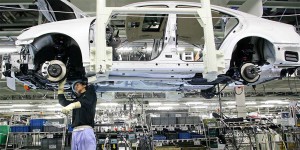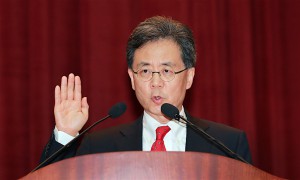
Negotiations between the U.S. and South Korea on a new free trade agreement will certainly include auto industry talks.
South Korea has agreed to renegotiate a five-year-old trade agreement establishing free trade rules between the two countries and automotive trade is very likely to be at the center of discussions, observers predicted.
The American and South Korean delegations met in Washington for a second round of talks on the deal, known as the KORUS FTA, this week, according to Newsweek magazine.
“The two sides recognized the need to amend the FTA to enhance mutual benefits of the KORUS FTA,” South Korea’s trade minister, Kim Hyun-chong, who had been one the deal’s lead negotiators, said in a statement issued to media after the discussions.
The Trump administration is expected to make the auto industry a key element of the upcoming discussions with the South Korean government, which relies on the U.S. for military support the continuing confrontation with an aggressive regime in North Korea.
(FCA, Hyundai rumors heating up again. For the story, Click Here.)
The administration, which also in the midst of pushing to revise the North American Free Trade Agreement, may push to increase the number of American-made cars that can be sold in South Korea, according to Bloomberg, which cited an expert from the Korea Economic Institute in Washington. The U.S. has an $18.8 billion trade deficit in vehicles with South Korea, making it a convenient target for U.S. negotiators.

South Korea’s trade minister, Kim Hyun-chong, said the previous trade agreement needs to be renegotiated.
South Korea treats the first 25,000 U.S.-made vehicles imported by each manufacturer per year as compliant with local safety and testing regulations, so long as the vehicles meet U.S. standards.
Lifting that cap would boost U.S.-made vehicle imports Matt Blunt, president of the American Automotive Policy Council, a Washington lobbyists for General Motors Co., Ford Motor Co. and Fiat Chrysler Automobiles NV on trade issues told Bloomberg.
“There’s a long list of regulations that are problematic, which we would argue have a disproportionate impact on U.S. automobile manufacturers,” Blunt said. “We think a way to cut through that would be to remove that 25,000-vehicle cap.”
(Click Here for details about Hyundai’s plans to expand its eco-friendly vehicle line-up.)
Hyundai Motor Co., South Korea’s dominant automaker, said the agreement has been beneficial to both nations.
“Hyundai has always supported free trade and highly values the trade pact between the United States and Korea,” it said in a statement. The deal “is particularly important from a geopolitical and strategic perspective,” it said.
United States Trade Representative Robert Lighthizer has said removing the barriers to U.S. trade with South Korea will be reducing the trade deficit and give Americans a better chance to succeed in global markets.
“President Trump continues to keep his promises to lower our trade deficit and negotiate better trade deals for American workers, farmers, ranchers, and businesses,” said Lighthizer.
(Hyundai struggles as new vehicle market changes. For the story, Click Here.)
“Since KORUS went into effect, our trade deficit in goods with Korea has doubled from $13.2 billion to $27.6 billion, while U.S. goods exports have actually gone down. This is quite different from what the previous Administration sold to the American people when it urged approval of this agreement. We can and must do better.”
